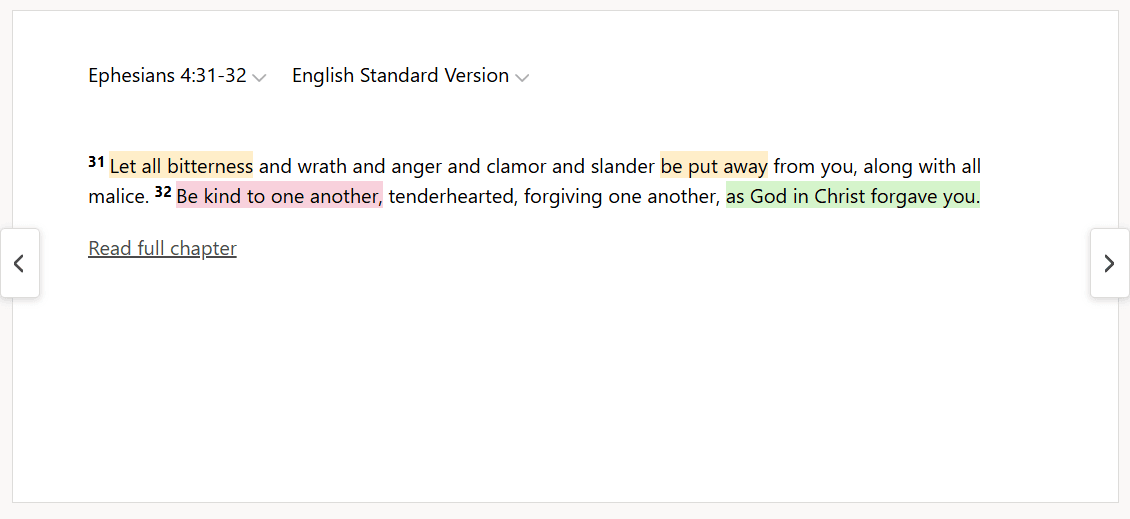
From Contempt to Compassion
 img:biblegateway.com
img:biblegateway.comThere is a certain engine, internal to the human psyche, always at work to prove ourselves right.
It’s an inner voice, a never-ending monologue which seeks to affirm whichever reasoned argument benefits us most.
This is reflected in Proverbs 21:5, “Every way of a man is right in his own eyes, but the Lord weighs the heart.”
Jeremiah seems to take it a step further when he warns, “The heart is deceitful above all things, and desperately sick; who can understand it?” (Jer 17:9)
The biggest problem in all of this is the difficulty we have in isolating that voice from whatever other voices are at work to influence our thinking.
Most importantly, there is the voice of the Holy Spirit, constantly at work through Scripture, through our prayers, and through His work on our conscience.
That voice - The Spirit - will almost always be differently directed.
If we cannot learn to discern our own self-justifying voice from the Voice of the Spirit, all kinds of trouble begins.
Last week, I suggested that we can attune ourselves better to God’s voice when we pursue a disciplined solitude.
Mind you, solitude does not mean isolation from the world.
Solitude is the healthy mode of “self” that eschews the more dangerous balms on offer in favor of sober self realization.
We may not always like what we find there, when we strip away all of the things distracting us from our true nature, but if we do that hard work we can at least find ourselves at the right starting point.
And one of the things we will all find, at least according to scripture, is that never-silent self-justifying voice.
Every way of a man is right in his own eyes.
Ouch.
Today I’d like to highlight one of the most harmful consequences of leaving that self-affirming voice unchecked: contempt for others.
From Animosity to Amiability
Because our inner voice is so perfectly tuned to self justification, our default setting towards other people is one of animosity.
There is bound to be someone reading this who is thinking, “this may be someone else’s problem, but it isn’t mine.”
If that’s you, double-check Proverbs 17:9. Then read on.
We find ourselves in contempt of others because as true as Proverbs 17:9 is for us, we know it’s true for everyone.
I’m the only person who has me as his #1 priority, after all, and on some level that places me in potential conflict with everyone.
When we’re at our weakest, the animosity bubbles to the surface.
Martin Luther found himself in conflict with people who literally wanted to kill him, but he had the sense to say, "I am more afraid of my own heart than of the pope and all his cardinals."
He knew where the real problem began.
What kinds of situations make us most hostile towards others?
- Opposition to our most precious opinions
- Dangers to our most loved relations
- Events that breed jealousy, suspicion, bitterness, or desire for revenge
- Threats toward our possessions
- Disruptions of our agendas
We will experience all of these (and more) throughout our lifetime, and when we do we will target people as our enemies.
And that inner voice of ours, left unchecked, will convince us that whatever retribution we choose is fully justified.
Knowing this, Paul writes to the Ephesians, and I’ll paraphrase:
Put away the contempt and let God’s love move you toward compassion.
Put away the animosity and let God’s love move you toward amiability.
Put away the grudge and let God’s love move you toward goodwill.
Put away the aggression and let God’s love move you toward affection.
I can do this all day.
From Bitterness to Benevolence
It begins by acknowledging (the Bible calls it “confessing”) that we have this problem by default.
It’s impossible to have any understanding of God’s forgiveness until you’ve come to a solid understanding of how desperately you need it.
That’s the point of confession. It’s not there to earn God’s forgiveness, it’s there so you’ll appreciate God’s forgiveness.
And that appreciation, says Paul to the Ephesians, is what unlocks your potential to move from bitterness to benevolence.
Imagine how important this is!
I’ll help you do that by listing some of the most crucial relationships, none of which can possibly function in the way God intended without the wisdom of Ephesians 4.
- Husbands and Wives
- Parents and children
- Teachers and Students
- Healers and Patients
- Lawmakers and the Public
- Judges and the Accused
- Entertainers and their Audience
You know that list goes on endlessly. It could be easily summarized, however, like this:
- You and your Neighbor.
God’s forgiveness creates a free and friendly space within which you and God can coexist.
Forgiveness puts an end to the conflict and creates a space for comfort.
That, as a starting place, enables you to create the same kind of space for your neighbor.
And imagine this, God’s forgiveness does not automatically cause you to agree with God about everything!
In fact, God’s forgiveness is given despite the immovable fact that you remain - to some extent - an enemy of God. You will sin again.
This point becomes crucial in understanding how we too can open up that same kind of space for our neighbor, even when our neighbor is presenting himself as an “enemy” to our agenda.
From Coldness to Cordiality
The German word is Gastfreundschaft: “friendship for the guest”.
The Dutch word is gastvrijheid: “the freedom of the guest”.
When we move from coldness to cordiality, we create a “free” and “friendly” space where the neighbor can become a friend instead of an enemy.
We do not welcome our neighbor in order to change him. That’s the equivalent of giving in to that less-than-trustworthy inner voice of ours that is constantly convinced in its own righteousness.
No, true cordiality is not a design to bring men and women to “our side”, but to offer freedom not disturbed by dividing lines.
It is not a method of making our God and our way into the criteria of happiness, but the opening of an opportunity to others to be found by God in our midst.
The art of hospitality is in creating an invitation for the “other” to fill an un-predefined space wherein two people have an equal opportunity to grow.
It is friendship without binding the guest and freedom without leaving him alone.
In varying degrees among all of us, we will be ambivalent, disinterested, afraid, opposed, and averse toward our neighbor. Those will be our spontaneous feelings.
God’s design is for us to be approachable, devoted, accepting, open, and affectionate toward our neighbor. Those feelings will be discovered in forgiveness.

From Hostility to Hospitality
In order for Jesus Christ to win our forgiveness, He had to empty himself.
That’s Philippians 2:7 where we are told that Jesus “...emptied himself, taking the form of a servant…”
A hostile heart is a full heart.
It is full of all of the words I’ve used above: animosity, aggression, anger, bitterness, contempt, coldness, division, grudges, and so on.
A hospitable heart is a heart that has been emptied of these things.
Jesus suggests this kind of poverty of the heart in the sermon on the mount when he says, “blessed are the poor in spirit…”
The only way to make heart-space for our neighbor is to empty our hearts of all that God has forgiven us.
Johannes Metz describes it best in his 1960 book titled “Poverty of Spirit”:
We must forget ourselves in order to let the other person approach us. We must be able to open up to him to let his distinctive personality unfold - even though it often frightens and repels us. We often keep the other person down, and only see what we want to see; then we never really encounter the mysterious secret of his being, only ourselves. Failing to risk the poverty of encounter, we indulge in a new form of self-assertion and pay the price for it: loneliness. Because we did not risk the poverty of openness (Matthew 10:39), our lives are not graced with the warm fullness of human existence. We are left with only a shadow of our real self.
By the way, what is that verse from Matthew that he references?
“Whoever finds his life will lose it, and whoever loses his life for my sake will find it.”
And there you have it.
Martin Luther referred to it as “seelsorge” - a word which means “care of souls”.
That’s what we’ve been called out of darkness for.
It takes courage, but our trust is in the God who has already laid out the plan before us.
Closing prayer
Heavenly Father, thank you for sending your Son to empty Himself so that I might be filled with your forgiveness. Send your Spirit to make me more courageous in emptying myself in the same way as Jesus, so that I might be ready to welcome my neighbor in His name. Amen.



